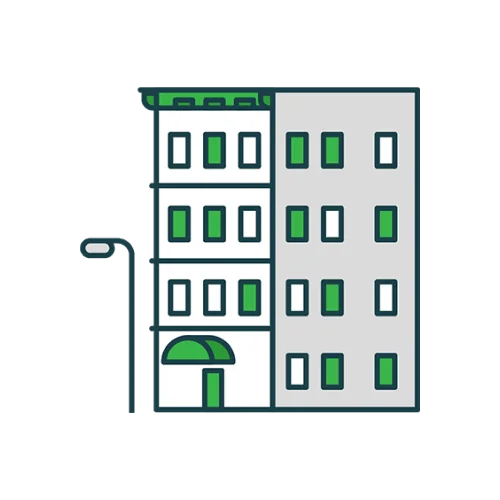How Does Insurance Work?
- Insurance 101
- /
- How Does Insurance Work?
What do buying a new car, renting an apartment, starting a business, and buying a house all have in common? Insurance.
Insurance is a fact of life for almost everyone at some point because we can’t control everything that happens around us. Insurance protects us from these things we can’t control. If the idea of policies and deductibles sounds foreign – don’t worry. We’re going to break down everything you need to know about the insurance basics and how insurance works.
How Does Insurance Work?
Simply put, insurance is a financial contract between one entity (the policyholder) and another (the insurer). In most cases, the policyholder is a person (you) and the insurer is your insurance company. The insurer agrees to pay a certain amount if or when the policyholder experiences a type of loss specifically named in the policy.
There are two primary types of insurance, property and casualty insurance, and health and life insurance. In property insurance, the losses you can sustain that a provider includes in a policy are sometimes called covered perils. What’s covered by your insurer varies by policy and coverage type.
For car insurance, a loss can be damaging your car in an auto accident. For homeowners insurance, a qualifying loss could be a hurricane ripping all the shingles off your roof. For health insurance, doctor visits and surgeries could be considered covered losses.
When you’re thinking about how insurance works, you may believe that any type of damage that you need to pay for qualifies as a loss, but most insurance companies will only cover losses specified in your insurance policy.
Insurance companies can’t cover everything because they still need to make money to stay in business. If they covered every little bit of damage to your car or home, they’d never survive. For this reason, it’s important to understand the fine print of your policy before filing a claim with your provider.
Understanding Insurance Claims
A claim is a document you send to your insurance provider after you experience a loss to begin the reimbursement process. If your loss is covered, your insurer should accept your claim and begin the process of reviewing the damage you’ve stated to determine the final payout. For property insurance claims, the company may send an adjuster to inspect your house or car to better understand the situation and what the insurance company should do to help.
Furthermore, carriers usually have limits for amounts on the amount they will pay for certain types of damage. Typically, the higher your limits, the more you pay for insurance.
To stay covered under the insurance policy, the policyholder is responsible for a premium. A premium is what your insurance payments are called. They’re typically due monthly, quarterly, or yearly.
Your insurer determines how much you pay through a process called underwriting. When underwriting, the insurance company uses a variety of factors (usually including your credit score, claims history, age, amount of coverage you want, and your location) to determine the likelihood of risk they’re taking on. The higher the chance that you might suffer a loss (file a claim), the higher your premium might be.
Should you experience a loss covered under your policy, you’re usually required to pay a deductible before the insurer will step in and cover the remaining cost of your loss. For example, if you experience a sudden electrical fire that causes $5,000 worth of damage, and you’ve got a $500 deductible, you’d receive $4,500 from the insurer. You’ll have to pay the $500 so your insurer can pick up the rest of the bill.
A deductible slightly reduces the amount of risk for your provider. Policyholders usually have some control over how high (or low) their deductibles are, and those rates may also influence the cost of your premiums.
How Do Insurance Companies Work?
Now that you know how insurance works, you may be wondering why so many different insurance companies exist. What are the real differences among them, and how do they afford coverage for so many people?
On a fundamental level, insurance companies exist to help protect you in the event of the losses described above. This is largely made possible by sharing the risk among a larger group of people. Your premiums are much lower than the possible damages you can incur since the insurance company can afford to pay them when it receives premiums from a lot of policyholders.
You could consider a group of people paying their monthly insurance premiums as putting money into a collective pot. If you have a specific insurance company and use them to cover your car insurance, your money goes to the same place as anyone else who uses that company. The insurance company is then able to offer coverage to everyone for a relatively lower rate by using the money from the combined premiums to cover everyone’s losses.
Even though this concept of insurance is largely the same for all carriers, the customer service, claims handling, and underwriting procedures vary by company. Not all insurers calculate risk the same way, which is why insurance premiums vary by insurer for similar coverage. This is why it’s crucial to shop around for insurance.
The Types of Insurance Policies
At Clovered, we deal with property and casualty insurance. We’ve laid out the insurance basics for you and explained what insurance companies do. But, the extent of policies available may be broader than you think. Here are just a few of the common types you might often see:
Homeowners Insurance
Homeowners insurance is a type of property insurance that financially protects the policyholder’s home and limits their liability.
In addition to covering the main structure and belongings of your house, home insurance also contains a provision for additional living expenses. Should the policyholder’s home get rendered unlivable by a covered loss, your insurer may reimburse you for expenses you rack up while you temporarily move out.
Another major aspect of homeowners insurance is liability coverage. Liability coverage allows your provider to cover costs, medical and legal, that could arise if you’re responsible for someone accidentally or suddenly getting hurt on your property.

We partner with the nation’s top homeowners insurance companies so you can get a custom policy at an affordable price.
Condo Insurance
Condo insurance has many of the provisions of homeowners insurance, but the risk factors that go into each policy vary slightly. As a result, the coverage is different and the premiums are different.
Condo insurance is specifically designed for unit owners. Even though the condo association may have its own insurance policy that you may contribute to as part of your monthly dues, this policy doesn’t protect the inside of your unit. This is why condo insurance policies exist.

Protect everything your condo association doesn’t with a custom condo insurance policy at an affordable price.
Renters Insurance
The cheapest property insurance option we’re going to outline, renters insurance may be the greatest bang for your buck. It focuses on safeguarding your belongings so you don’t have to worry about your things getting damaged.
Renters insurance is so relatively affordable because renters simply have less to cover. There’s no house or dwelling involved.

Averaging just $12 per month, renters insurance can protect your belongings for the cost of a few cups of coffee.
Landlord Insurance
Landlord insurance is a type of coverage that financially protects a landlord from losses that stem from a property they’re renting out. You can only get homeowners insurance on a house you currently occupy. To cover a house you own that someone else lives in, you need a landlord policy.
Landlords take on risks by letting someone else live on their property. More things can go wrong when you’re not there around the clock to look after them. Landlord insurance can give you some peace of mind by transferring some of this risk financially to your insurer.

You’ve worked hard to buy your rental property. Protect it with a custom policy at an affordable price.
Flood Insurance
Home insurance doesn’t cover floods because they tend to be the most costly natural disaster. Homeowners insurance premiums would be too high if carriers had to factor in the potential costs of floods. So, to protect your house and your belongings from flooding damage, you need flood insurance.
For a long time, flood insurance was only available through the government since it was too costly for a private company to offer it and make money at the same time. But, as technology and risk management have improved over time, private companies are now able to offer viable alternatives to the government’s flood insurance program, called the NFIP.

Do you want to pay for costly and common flood damage yourself or have an insurance policy pick up the tab?
Car Insurance
Auto insurance is the only type of property insurance the government requires you to carry (as long as you drive a car). This is because commuting is inherently dangerous, and we can’t control other drivers on the road.
Car insurance will cover medical expenses and property damage that you may cause to others when driving, and it can also cover damage your vehicle can sustain depending on what kind of coverage you get.

Rethink your auto insurance premium with a free quote from the nation’s top companies.

We partner with the nation's top home insurance companies so you can get an excellent policy at an affordable price.
The editorial content on Clovered’s website is meant to be informational material and should not be considered legal advice.
Similar Articles